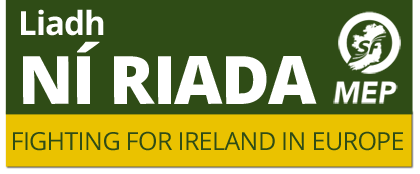
Liadh Ní Riada and her Sinn Féin colleague Lynn Boylan have welcomed the European Parliament´s successful vote today on passing the EU Strategy on plastics.
Both have been working with environmental NGOs and scientists in playing a front role in raising awareness and fighting against the widespread pollution of plastics.
Ms Ní Riada, who sits on the EU Fisheries Committee and was a key author of the strategy, spoke in a debate on the issue in Brussels last night.
“Plastics are polluting our planet at a frightening speed and it is simply not good enough for the de facto coalition of Fine Gael and Fianna Fail to continue hopping on whatever good news train comes along without critically engaging and contributing,” she said.
“Our governments and corporations must transform the way plastics and plastic products are designed, produced, used and recycled. We need to eliminate plastic pollution and so we endorse the EU´s objective to make all plastic material reusable and recyclable by 2030.
“The report calls for several measures that go beyond the European Commission’s proposals, including banning microplastics in cosmetics, personal care products, detergents and cleaning products by 2020 and completely banning oxo-degradable plastics by 2020, which, contrary to their name, do not safely biodegrade.
“The fact of the matter is that biodegradable and compostable plastics do not prevent plastic pollution and should not be an excuse to litter or keep consuming single-use plastics.
“To say plastic has its uses is an understatement but we as citizens need to change our approach as consumers, as do corporations, manufacturers, governments and legislators.
“Every year about 26 million tonnes of plastic waste is generated in the EU alone. Less than 30% of it is recycled..
“There was a significant study carried out earlier this year by NUI Galway which found that 75% of deep sea fish in the North West Atlantic had plastics in their stomachs.
´”The fish that were studied live between 200 and 1000 metres beneath the ocean’s surface, and are an important food source for many species including ourselves. So it’s a grave health hazard.
“Later this year there will be a plenary vote in the European Parliament on a separate legislative proposal to ban certain single-use plastics such as cutlery and plates as well as requiring goods packaging companies to contribute towards the cost of cleaning up discarded plastic.
“Both myself and Lynn Boylan are also negotiators of this file in our respective committees and we will be pushing hard for these reforms.
“If we do no act now the UN has warned that there will be more plastic in our oceans than fish by 2050. Already there is a zone of plastic growing in the Pacific that is three times larger than France, and its getting bigger.
“Plastic pollution, like climate change, like fossil fuel emissions that pollute the air that we breath, like the loss of biodiversity through the destruction of rainforests and ocean ecoystems, has become a serious danger not only to our wellbeing but to our planet.
“We as ordinary people are responsible for tackling it. We must put pressure on our mainstream media to help spread awareness and to force governments and corporations to change their approach.”
We use cookies to give the best experience on our site. By continuing to browse our site, you agree to our use of cookies. You can change your cookie settings at any time. View our privacy policy
×